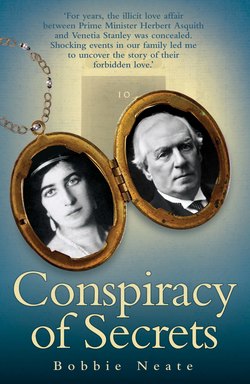Читать книгу Conspiracy of Secrets - Bobbie Neate - Страница 5
На сайте Литреса книга снята с продажи.
PROLOGUE
ОглавлениеNames have always fascinated me. I don’t know why. Was it because at each family mealtime Louis Stanley, my stepfather, had acquired another famous individual to add to his elite social circle? To my childish ears each celebrity appeared to have a strange sounding name. Fancy being landed with the name ‘Aga Khan’ or ‘Beaverbrook’? I teased myself with the images the names invoked as I sat at the kitchen table bored with adult conversations. Or did I have a fascination with names because my own surname had been summarily dismissed. Nobody ever explained and I was too fearful to ask why I used to be at the top of the school register and then suddenly to my utter dismay, my position plummeted to the nether reaches of the roll call. However my childhood fascination with nomenclature was to help solve an intriguing adult mystery.
Lurking in my childhood were suspicions. What was I uneasy about? I don’t know. There had always been mysteries. Things I knew not. Things that were not to be asked. The mantra of childhood was never to question, and slowly this secrecy drifted into my maturity; but there always lurked those dark suspicions. Suspicions too deep to raise, too disturbing to examine. So why disturb the calm? Little did I know when I was five that fifty years later I would be forced to confront my fears and start delving into the lives of others.
The event that sparked my change of mood was my mother’s deep stroke when she was nearly ninety. At this juncture in my life, my stepfather began to act bizarrely. His unsettling behaviour compelled me to enter into the labyrinth of secrets and conspiracies, which were so carefully concealed for one hundred years. I had to ride the pain of reconsidering my early home life, and it was not until I started asking questions that I had confirmation about my parentage.
My mother divorced my father, an Anglican vicar, in 1955. At that time, and unbeknown to me, the divorce was a cause célèbre and even featured in the tabloid press. In May of the same year, my mother remarried and her new husband, and our stepfather, was Louis Stanley. He had previously been known to us as Uncle Louis.
I was the youngest child and must have unwittingly absorbed sufficient clues to initiate my truth-seeking voyage. Once afloat, I retrieved the two most vital titbits my stepfather had accidentally divulged about his past. These clues dangled tantalisingly in front of me as I steered myself through a storm that blasted away the scales that once covered my childhood eyes, enabling me to see my port of call with a more detached heart. My first job was to recall Stepfather’s words to us all as I sat teetering on a tiny stool at the kitchen table. Family talk about his two female relatives, which my stepfather had been so quick to persuade my mother to house, added fuel to my search.
As I made progress with my sleuthing I applied more rigour to my reading. Intrigue was not enough, nor were my childhood memories. They needed to be fused with historical data. There was no one particular detail that helped my conjectures. It was an accumulation of minute pieces of evidence – particulars that were inconsequential to those who had not lived in the same house as this devious man. There was no decisive paper trail, no one piece of research, just numerous connected suppositions. Some historical facts were of immediate relevance to my conjectures while others appeared immaterial. Each time I filled one section of my puzzle I had to revisit the paperwork as a place, a date or a political name that I had previously ignored now became uppermost in my mind. Each step, rather than helping me progress, pushed me into another trail of discovery and yet another list of names and potential clues.
Years previously, when I had first spotted a photograph of Prime Minister H. H. Asquith, I was hit with unease. There I saw a man who looked just like my stepfather. The images were so powerful that I was never going to forget them. How fortunate it was that father and son were so alike. It is not always so. Historians of the 1980s knew Herbert Henry Asquith had been ‘close friends’ with Venetia Stanley, but because of the age differences they speculated it was an unconsummated affair. They made no conjectures about a lovechild. It was our unusual and distasteful upbringing that allowed me to prise open the conspiracy of secrets and remove them from the political safe.
When I started writing I had no idea that this tale would develop into my own personal detective story and a whole lot more. Questions from childhood emerged sleepily from the deep recesses of my brain and then gathered pace as each piece of my genealogical jigsaw took on new meanings. My sleuthing and investigative work dragged me down into a shadowy scheming world.
Just as in other spheres of detective work, my journey raised many questions. I can provide a satisfying explanation for some but for others there are no neat answers. At times my solutions are not the only possible ones and, as so often happens in research, as soon as one question is answered another arises. So you, my reader, might like to surmise possible solutions to my many imponderables, since, in my view, the loose ends only add to the mystery. Even now after all my efforts to place my story on paper I still find parts of the tale barely credible.
